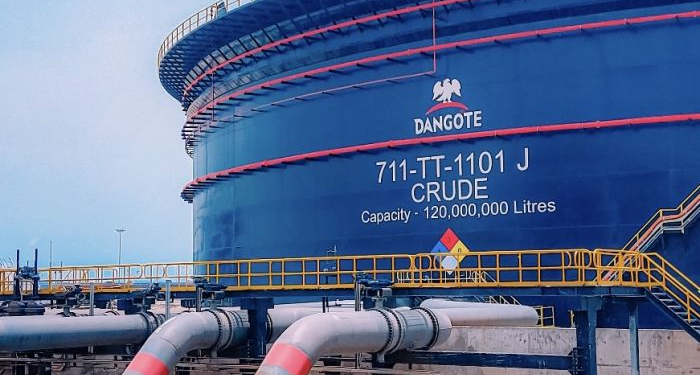Chinese energy giant PetroChina has been waiting to offload a shipment of U.S. crude oil at Dangote refinery for almost a month due to issues with payment, according to four trading sources and shipping data.
The 2-million-barrel cargo of West Texas Intermediate (WTI) crude oil, transported by PetroChina on the supertanker Maran Mira, has been anchored off Nigeria since March 28, according to shipping data from LSEG and Kpler.
The completion of the oil transaction between PetroChina and Dangote has been postponed because the refinery has not yet provided a letter of credit to the Chinese trader, source familiar with the situation told Reuters.
A letter of credit Is the most prevalent type of trade financing. The bank of the buyer issues a letter to the bank of the seller, assuring payment to the seller upon the arrival of goods.
Two other sources also informed Reuters that the refinery has faced challenges in obtaining dollars via the Nigerian government, as the depreciation of the naira against the U.S. dollar and the increase in global oil prices have put a strain on Nigeria’s financial resources.
PetroChina is transporting an additional 2 million barrels of WTI crude on the supertanker Kondor heading towards Nigeria, as per another source and ship tracking data from LSEG.
Potential vendors of U.S. WTI crude to Dangote have faced challenging payment conditions: either a 60 to 90 day credit or a barter of refined products for the crude oil, as three sources reported. Normally, credit terms for oil transactions are about 30 days.
A shipbroker estimated that the ship is incurring demurrage costs of around $65,000 a day.
Dangote group executive Edwin Devakumar told Reuters that seeking favourable sale prices and credit terms were normal business practices.
“If someone gives me one year credit, I’ll grab it and if not, I’ll negotiate the best possible deal.
“When you go to a shop to buy something. You’ll try the best possible deal and I do the same,” he said.
Dangote Refinery Plans to Ramp up Production
The refinery commenced operations in January and has recently achieved half of its capacity.
However, plans to increase production are hindered by the need to secure billions in working capital to purchase significant quantities of crude oil, according to trading sources.
Devakumar did not provide details on the current operational levels of the refinery.
Currently, the facility imports approximately 10 crude oil cargoes monthly, two traders indicated.
This is about half of the 650,000 barrels per day (bpd) capacity it aims to achieve later this year or the next.
Reaching this capacity would position it as the largest refinery in both Africa and Europe.
Data from Kpler indicates that the refinery received 8.4 million barrels of Nigerian and U.S. crude in March and another 5.4 million barrels in April so far.
Additionally, it is expected to receive 1 million barrels of Nigerian crude on April 27.
Trafigura, Mercuria, Vitol, Shell and NNPC were among Dangote’s suppliers of crude last month, according to Kpler.
For years, Nigeria has depended on costly imports to fulfil nearly all its fuel needs. However, with the $20 billion refinery, the country is poised to transform into a net exporter of fuel to neighbouring West African nations.
This represents a significant potential change in the power and profit dynamics within the industry.
Meanwhile, since its inauguration in May last year by former President Muhammadu Buhari, Nigerians have been eagerly anticipating the release of products from the Dangote refinery.
The new 650,000 barrel-a-day oil refinery commenced operations in January.
Initially targeting a processing rate of 350,000 barrels per day, the refinery aims to gradually escalate production towards its full capacity.
While the refinery primarily sources domestic crude through a supply agreement with the trading arm of the state-owned NNPCL, it recently received its first shipment of Nigeria’s Agbami crude, facilitated by a trading unit of Shell.
Subsequent deliveries included Nigeria’s Amenam, Bonny Light, and CJ Blend streams.




